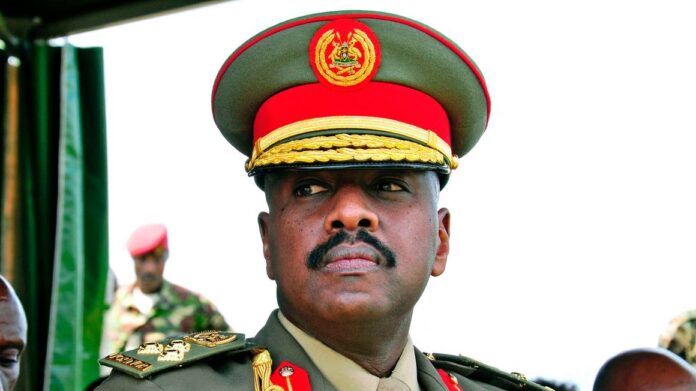Muhoozi Kainerugaba, the eldest son of Uganda’s long-serving autocratic leader, is set to contest in the 2026 presidential election in a gambit that could potentially see the military officer take full control of this soon-to-be oil-producing nation that has been under the firm grip of his father for nearly four decades.
His bid for the presidency has shaken structures in the ruling National Resistance Movement party and military. Last month, General Kainerugaba who also serves as the presidential adviser on special operations launched a campaign team comprising notable politicians and other key personalities as part of his campaign efforts. He has also begun appearing at rallies for his supporters.
“I will stay in touch and engaged with you in regards to the next steps of my campaign,” he told a cheering crowd of mainly youthful supporters known as the MK movement, who constantly interrupted his speech with clapping, ululations, and chanting at a rally held in Kapchorwa, northeastern Uganda in January.
But veteran opposition leader Kizza Besigye says that what Muhoozi is attempting to do is create a new power base that will attract the attention of young people who have lost interest in the ruling party and its leader.
“He wants to create something that appears new, although it is exactly the same thing,” Besigye told Ubuntu Times.
Mr. Museveni has long been suspected of grooming the 48-year-old general to be his successor in order to establish what opponents call monarchical rule in Uganda. This follows a playbook by other authoritarian dictators in Africa, such as Equatorial Guinea’s Teodoro Obiang Nguema Mbasogo and Cameroon’s Paul Biya’, who have attempted to anoint their sons as the next presidents.
General Kainerugaba’s rallies are also against Ugandan law, which prohibits serving army officers from participating in politics. The 1995 Constitution and the Uganda People’s Defence Force Act – UPDF 2005 bar or prohibit serving army officers from dabbling in partisan politics.
“He is perpetuating the abuse of the constitution, abuse of the law and this disqualifies him from being considered a leader,” says Besigye. “He is acting against the country and cannot aspire to lead it at the same time.”
General Kainerugaba has also earned himself the name “the tweeting general” with his controversial tweets. Just like former US President Donald Trump, the general uses Twitter to promote his profile. He once tweeted that the Ugandan army might invade Kenya.
“It wouldn’t take us, my army and me, two weeks to capture Nairobi,” he tweeted.
This prompted Mr. Museveni to relieve him of his then duties as commander of the UPDF’s Land Forces and denounce his controversial use of Twitter. However, Museveni still promoted Kainerugaba to a five-star general and retained him as his adviser on military affairs.
Last year, Kainerugaba held a spree of lavish birthday celebrations across the country. The celebrations were attended by Rwanda’s President Paul Kagame. Political analysts contend that these are all clear signs that Kainerugaba is being maneuvered into place to succeed his father.
General Kainerugaba joined the army in 1999 after graduating from the Royal Military Academy at Sandhurst in England. He rose through the ranks to command the presidential security unit, which has now been expanded into an elite Special Forces Command SFC group. The SFC protects the president, his family, and critical assets including oil fields.
With an estimated 10,000 men, the SFC is Uganda’s most powerful branch of the army. Kainerugaba led the SFC from 2008 to 2017, and later from December 2020 to July 2021, during the tumultuous presidential election season.
In July 2021, he was promoted to lead the Uganda land forces, the army’s main component but later demoted by his father-the commander in chief, following a string of divisive tweets that sparked domestic and international uproar.
Ibrahim Ssemujju Nganda, Member of Parliament and the spokesperson of the main opposition party, Forum for Democratic Change FDC, says that Museveni is merely seeking to create an uneven playing field for anyone attempting to oppose him come 2026.
“This is again another tactic Mr. Museveni is using to prolong his rule,” said Ssemujju.
Many Ugandans continue to decry the controversial rule of President Museveni who has been in power for 37 years now. In 2021, Mr. Museveni secured for himself five more years as president in a general election that was marred by violence and claims of vote-rigging by his main challenger famous musician Robert Kyagulanyi Ssentamu well known by his stage name Bobi Wine.
Because of the 2017 constitutional reform that removed the age limit, there is nothing in the constitution that prevents Mr.Museveni from standing again and again. Presidential term limits were also removed in 2005. Museveni’s new term ends in 2026 and by then he will have ruled Uganda for 40 years.
On January 24, Museveni launched Uganda’s first drilling rig for the Kingfisher oilfield, operated by China’s CNOOC company and estimated to bring in more than $50 billion. A local NGO organized a public debate on the East African Crude Oil Pipeline at a city hotel on the same day. Opposition leaders Kizza Besigye and Robert Kyagulanyi were among the invited speakers, but a military squad barricaded and sealed up the hotel entrance, denying the public access to the venue and canceling the event.
“I don’t mind Kainerugaba’s intentions to run for president, but I’m concerned about the vulgarization of national institutions like the UPDF army. He should first quit the army,” said Sarah Bireete, the executive director of a local think tank, Center for Constitutional Governance.

